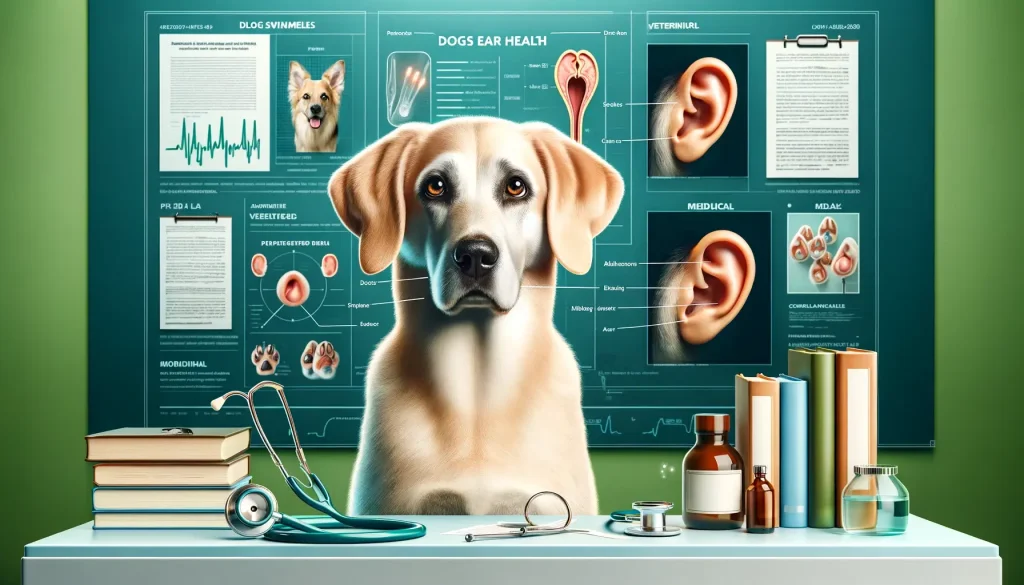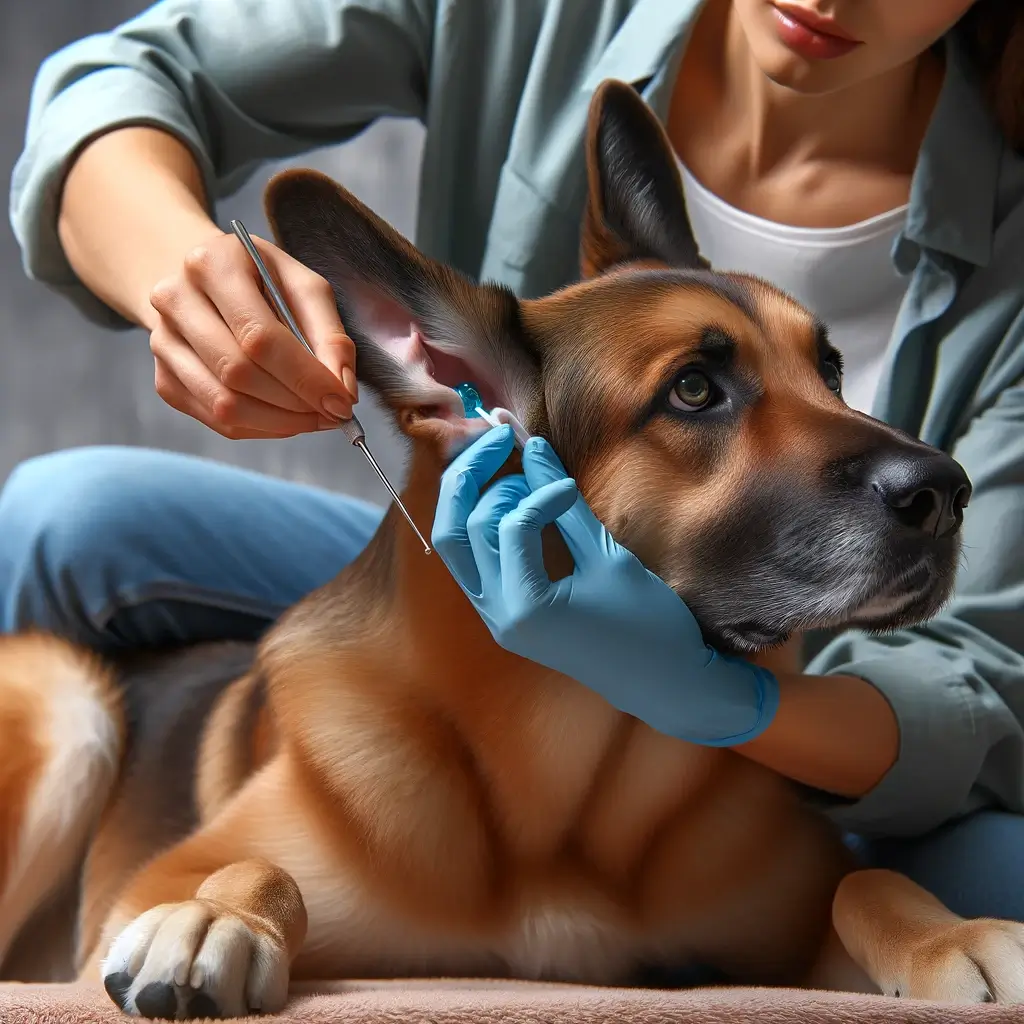
Why Is Your Dog’s Ear Swollen?
When your furry friend starts to exhibit discomfort, swatting at their ears, or holding one ear oddly, it might be time to examine their ears closely. Swelling in a dog’s ear can be a sign of various underlying issues, some of which require immediate attention. In this article, we’ll explore six common causes of ear swelling in dogs and the corresponding treatments to help your canine companion feel better. From ear infections to allergies, and more serious conditions like ear hematomas, identifying the cause is the first step to recovery. But, what can dog owners do at home before professional veterinary care is provided, and how can these conditions be prevented in the future?
Identify and Treat Common Ear Problems in Dogs
Dog owners might find their pets uncomfortable or irritable when experiencing ear swelling. Different factors ranging from infections to allergies could be the culprits. Recognizing the causes can empower owners to seek the right treatments promptly. Let’s delve into six reasons why your dog may have a swollen ear and discuss how to tackle each issue.
- Ear Infection: A prevalent issue among dogs, especially those fond of swimming, is an ear infection. The dampness encourages yeast and bacteria growth, leading to swelling.
- Treatment: Regularly check your dog’s ears for redness, unpleasant smell, or discharge. These signs necessitate a visit to the vet for antifungal or antibacterial treatments.
- Allergy: Dogs react to allergens causing ear inflammation and making them scratch or shake their heads.
- Treatment: Identifying and avoiding the allergen is key. In some cases, vets may prescribe medications to alleviate symptoms.
- Insect Bite: A sting or bite from an insect can provoke allergic reactions, leading to ear swelling.
- Treatment: For severe reactions showing symptoms like difficulty breathing, it’s crucial to seek emergency veterinary care.
- Foreign Bodies or Wax Build-Up: Either can obstruct the ear canal, resulting in swelling.
- Treatment: Professional removal by a vet is necessary to clear the blockage safely.
- Ear Mites: These parasites cause significant discomfort alongside inflammation and hair loss.
- Treatment: Medicated eardrops prescribed by a vet can eliminate the mites effectively.
- Ear Hematoma: Burst blood vessels in the ear flap create swelling and might need intervention.
- Treatment: Consultation with a vet is required. Treatment may involve draining the hematoma, with cortisone injections or surgery as possible options depending on severity.



It’s imperative for dog owners to observe any symptoms of ear problems and consult a veterinarian for diagnosis and treatment. Early intervention can prevent discomfort and more serious health issues for your pet.
Easy Home Checks and Care for Your Dog’s Ear Health
As a pet owner, you play a vital role in maintaining your dog’s ear health and catching symptoms early. Understanding the common causes of ear swelling allows you to perform simple checks and apply care at home. Let’s outline what you can do.
- Regular Ear Examination: Make it a habit to inspect your dog’s ears routinely for any signs of redness, discharge, or bad odor. Early detection of these symptoms can prompt a timely visit to the vet, preventing further complications.
- Keep Ears Dry: Especially after baths or swims, ensure to dry your dog’s ears thoroughly. This step is crucial for dogs prone to ear infections since moisture creates a breeding ground for yeast and bacteria.
- Gentle Cleaning: Using prescribed or vet-recommended ear cleaning solutions can help maintain clean ears and prevent wax build-up. It’s essential to follow your vet’s instructions carefully to avoid damaging your dog’s ear canal.
- Parasite Prevention: Regular use of parasite prevention treatments can keep ear mites at bay. Consult with your vet for the best preventative measures tailored to your pet’s lifestyle and health.
- Allergen Avoidance: If your dog has a known allergy that contributes to ear problems, take steps to minimize their exposure to these allergens. This proactive approach can significantly reduce the likelihood of allergic reactions leading to ear swelling.
- Emergency Preparedness: In case of an insect bite or if you notice rapid swelling and severe discomfort, have your vet’s emergency number handy. Quick response to such reactions can be life-saving.

Implementing these steps at home can help manage and prevent some common causes of ear swelling in dogs. Still, always consult your vet for a diagnosis and treatment plan tailored to your dog’s specific condition. Taking an active role in your dog’s ear health can lead to a happier, more comfortable pet.
When to Seek Veterinary Help for Your Dog’s Swollen Ear
Noticing your dog’s ear swelling can be alarming. It is crucial to know when to visit the vet for this issue. Here, we will discuss scenarios that warrant professional medical attention to ensure your furry friend’s well-being.
Ear infections are common in dogs, particularly in breeds that love swimming. The moisture can trap bacteria or yeast, leading to infections. Signs include redness, discharge, or a foul smell. These symptoms indicate it’s time for a vet visit. Your vet may prescribe antifungal or antibacterial treatments to clear the infection.
Allergies can also lead to ear swelling. If your dog excessively scratches its ears or shakes its head, an allergy might be the cause. A veterinarian can help identify the allergen and suggest ways to avoid it, possibly prescribing medication to ease the inflammation.
Insect bites or stings can cause immediate swelling. Symptoms of a severe reaction include difficulty breathing, an irregular heartbeat, or rapid swelling. This is an emergency, and you should seek veterinary care immediately.
Foreign bodies or wax build-up in the ear canal can cause discomfort and swelling. Do not attempt to remove the object yourself, as this could cause further damage. A vet can safely remove the blockage and provide relief.
Ear mites are a common issue causing inflammation, discharge, and sometimes hair loss. These parasites are contagious and require treatment with medicated eardrops prescribed by a veterinarian.
Ear hematomas occur when blood vessels in the ear burst, leading to swelling. Depending on the severity, treatment options may include draining the hematoma, cortisone injections, or in severe cases, surgery. Prompt veterinary consultation is required to determine the best course of action.
Any significant change or discomfort in your dog’s ear should prompt a visit to the vet. Early professional intervention can prevent more serious health issues and ensure your pet’s quick recovery. Remember, your vigilance as a pet owner can make a significant difference in your dog’s ear health.

Preventative Measures for Ear Health in Dogs
Prevention is key when it comes to your dog’s ear health. By understanding the causes of ear swelling, pet owners can implement strategies to mitigate the risks. Let’s explore some effective measures to keep your furry friend’s ears healthy.
- Regular Ear Cleaning: Establish a routine of checking and gently cleaning your dog’s ears. This can prevent issues like ear infections and wax build-up. Use a veterinarian-recommended ear cleaner and follow the correct technique to avoid injury.
- Keeping Ears Dry: After bathing or swimming, make sure to thoroughly dry your dog’s ears to prevent moisture accumulation, which is a breeding ground for yeast and bacteria growth.
- Diet and Allergy Management: Identifying and managing allergies can significantly reduce the risk of ear swelling. Some dogs may require a special diet to avoid allergens that trigger ear problems.
- Parasite Control: Regular treatments for parasites will help in preventing ear mites, a common cause of ear discomfort and inflammation in dogs.
- Inspect for Foreign Bodies: After outdoor activities, check your dog’s ears for any foreign objects or debris that could cause irritation or blockage.
- Regular Veterinary Check-ups: Regular check-ups with a veterinarian can help catch and address any ear health issues before they escalate into serious conditions.

By taking these proactive steps, you can minimize the risk of ear problems and contribute to the overall well-being of your pet. Remember, early detection and prevention are crucial for maintaining your dog’s ear health.